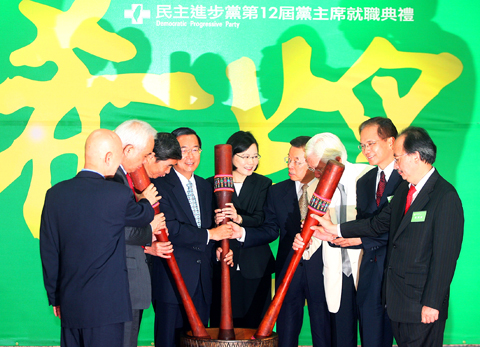Democratic Progressive Party (DPP) Chairwoman Tsai Ing-wen (蔡英文), who was sworn in yesterday, said that she was concerned that President Ma Ying-jeou (馬英九) talked a lot about closer cross-strait relations in his inaugural speech on Tuesday, but made no mention of Taiwan's sovereignty.
“In his entire inaugural speech, Ma didn’t say Taiwan or the Republic of China is a sovereign state,” Tsai said at her inauguration at DPP headquarters in Taipei yesterday morning.
“He didn’t even mention that Taiwan’s future should be decided by all Taiwanese people — something he repeatedly said during his presidential campaign,” Tsai said.

PHOTO: WANG YI-SUNG, TAIPEI TIMES
“It is worrying that the Chinese Nationalist Party [KMT] seems to be overlooking the issue of Taiwan’s sovereignty,” she said.
Tsai won the chairmanship election on Sunday with more than 73,000 votes — making her not only the DPP’s first chairwoman but the highest vote-getter in the party’s history.
Tsai said the DPP would strive to protect Taiwan’s sovereignty while maintaining the nation’s cultural and ethnic diversity.
“Ma’s inaugural speech made me believe that the DPP will be carrying a heavy burden,” the chairwoman said.
“We must stand united with other political parties that share our beliefs to defend Taiwan’s interests, review the party’s accomplishments and mistakes, further connect ourselves to society, work to deepen Taiwan-oriented values and defend social justice in the globalized world,” Tsai said. “Then the DPP will rise again.”
Her predecessor Frank Hsieh (謝長廷) agreed with Tsai and called on all party members to stand behind her.
Tsai also said that the DPP would develop an economic plan different from that of the KMT.
“As an opposition party with governing experience, the DPP must come up with a set of economic strategies to overcome the challenges brought about by globalization,” she said.
“The DPP’s economic policy will put equal weight on economic growth, social justice and ecological conservation,” she said.
“We must provide the people with an enjoyable life, high-quality education and a clean environment — that’s how the DPP will differ from the KMT,” she said.
Tsai got straight down to work yesterday afternoon by presiding over the weekly Central Standing Committee meeting. She asked the committee members to start brainstorming on campaign strategies for next year’s county commissioner and mayoral elections.
“We also touched on improving the party’s ability to deal with policy issues, talked about setting up a think tank and discussed some legislative bills,” she told a press conference after the meeting.

Chinese Nationalist Party (KMT) Chairman Eric Chu (朱立倫), spokeswoman Yang Chih-yu (楊智伃) and Legislator Hsieh Lung-chieh (謝龍介) would be summoned by police for questioning for leading an illegal assembly on Thursday evening last week, Minister of the Interior Liu Shyh-fang (劉世芳) said today. The three KMT officials led an assembly outside the Taipei City Prosecutors’ Office, a restricted area where public assembly is not allowed, protesting the questioning of several KMT staff and searches of KMT headquarters and offices in a recall petition forgery case. Chu, Yang and Hsieh are all suspected of contravening the Assembly and Parade Act (集會遊行法) by holding

PRAISE: Japanese visitor Takashi Kubota said the Taiwanese temple architecture images showcased in the AI Art Gallery were the most impressive displays he saw Taiwan does not have an official pavilion at the World Expo in Osaka, Japan, because of its diplomatic predicament, but the government-backed Tech World pavilion is drawing interest with its unique recreations of works by Taiwanese artists. The pavilion features an artificial intelligence (AI)-based art gallery showcasing works of famous Taiwanese artists from the Japanese colonial period using innovative technologies. Among its main simulated displays are Eastern gouache paintings by Chen Chin (陳進), Lin Yu-shan (林玉山) and Kuo Hsueh-hu (郭雪湖), who were the three young Taiwanese painters selected for the East Asian Painting exhibition in 1927. Gouache is a water-based

Taiwan would welcome the return of Honduras as a diplomatic ally if its next president decides to make such a move, Minister of Foreign Affairs Lin Chia-lung (林佳龍) said yesterday. “Of course, we would welcome Honduras if they want to restore diplomatic ties with Taiwan after their elections,” Lin said at a meeting of the legislature’s Foreign Affairs and National Defense Committee, when asked to comment on statements made by two of the three Honduran presidential candidates during the presidential campaign in the Central American country. Taiwan is paying close attention to the region as a whole in the wake of a

OFF-TARGET: More than 30,000 participants were expected to take part in the Games next month, but only 6,550 foreign and 19,400 Taiwanese athletes have registered Taipei city councilors yesterday blasted the organizers of next month’s World Masters Games over sudden timetable and venue changes, which they said have caused thousands of participants to back out of the international sporting event, among other organizational issues. They also cited visa delays and political interference by China as reasons many foreign athletes are requesting refunds for the event, to be held from May 17 to 30. Jointly organized by the Taipei and New Taipei City governments, the games have been rocked by numerous controversies since preparations began in 2020. Taipei City Councilor Lin Yen-feng (林延鳳) said yesterday that new measures by